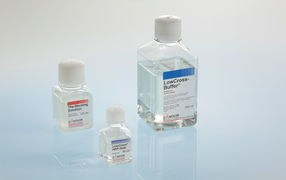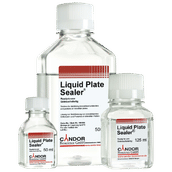
CANDOR Bioscience

LowCross-Buffer is an antibody and sample diluent for immunoassays such as ELISA, EIA, RIA, protein arrays, western blotting, immuno-PCR or immunohistochemistry.
It prevents many matrix and interfering effects as well as interferences and therefore increases the reliability of results. False positive and false negative signals as well as high background can be prevented in many assays by using LowCross-Buffer.
The formulation of LowCross-Buffer helps to reduce interferences in immunoassays. Thus quality of detection can be significantly improved. Nonspecific binding of the antibodies, negative effects of interfering substances and low or medium affinity cross-reactivities of the antibodies are minimized.
The specific and high affinity binding of the antibodies will not be affected negatively. In addition, matrix effects coming for example from blood sera or plasma specimen are reduced. That means that matrix effects no longer exacerbate detection of analytes.
Product classification LowCross-Buffer®
Product categories
Applications
Manufacturers of similar products
Advertisement
Find more buffers and related products
Find LowCross-Buffer® and related products in the theme worlds
Topic world Antibodies
Antibodies are specialized molecules of our immune system that can specifically recognize and neutralize pathogens or foreign substances. Antibody research in biotech and pharma has recognized this natural defense potential and is working intensively to make it therapeutically useful. From monoclonal antibodies used against cancer or autoimmune diseases to antibody-drug conjugates that specifically transport drugs to disease cells - the possibilities are enormous

Topic world Antibodies
Antibodies are specialized molecules of our immune system that can specifically recognize and neutralize pathogens or foreign substances. Antibody research in biotech and pharma has recognized this natural defense potential and is working intensively to make it therapeutically useful. From monoclonal antibodies used against cancer or autoimmune diseases to antibody-drug conjugates that specifically transport drugs to disease cells - the possibilities are enormous




